|
|
|
|

|
|
|
|
THE Peter Sellers
COLLECTION
I'm All Right Jack
Hoffman Heavens Above!
The Smallest
Show on Earth
Two-Way Stretch
Carlton-Browne of the F.O.
Reviewed by Glenn Erickson
Following up on its excellent
Alec Guinness Boxed Set from last year,
Anchor Bay this January released a six-disc Peter Sellers set, which carries on with the same
high-quality transfers and attention to detail. Unlike the Guinness (mostly Ealing Studio) comedies,
the majority of these are from British Lion, and are in general a little lower on the prestige meter in UK
film history. Even more surprising is that the majority of the films feature Sellers in secondary or
minor roles. His name is a good hook with which to package some otherwise hard-to-sell titles, but
the collection might better be called Droll Brit Comedies that Peter Sellers Just Happened to
be In. When he does have major roles, don't expect Inspector Clouseau.
Actually, most of the films represented here have to be chalked up as Salad Days efforts - good
character work, a lot of it under ethnic or age makeup - that for most actors might only pay off with
similar jobs, until the public got itchy to see a new face. Sellers' effort seems
to have been to step into Guinness'es Man-of-1,0000-Faces shoes, to bill himself as a chameleon.
Few actors have done this well, as the public usually prefers predictable screen personae ... a
possible example might be Tony Randall, for a few pictures in the 60s. The Mouse that Roared,
a Columbia film, proved to be Sellers' international launch film, although the wild I'm All
Right Jack cemented his popularity in England. One thing positive to say about the majority of
these titles, is that by & large they're more interesting than many of Sellers' high profile hits later
on in the 60s.
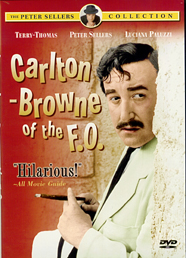
|
Carlton-Browne of the F.O.
Anchor Bay
1959 / b&w / 1:78 anamorphic 16:9 / 90 min. / Man in a Cocked Hat /
Street Date January 21, 2003 / $89.98 (19.98 indiv.)
Starring Terry-Thomas, Peter Sellers, Thorley Walters, Raymond Huntley,
Miles Malleson, John Le Mesurier, Kynaston Reeves, Luciana Paluzzi, Ian Bannen, Irene Handl
Cinematography Mutz Greenbaum
Production Designer
Edited by Anthony Harvey
Original Music John Addison
Written by Roy Boulting and Jeffrey Dell
Produced by John Boulting
Directed by Roy Boulting
|
|
|
|
|
Synopsis:
The neglected country of Gallardia becomes big news when the British F.O.
(Foreign Office) finally remembers it exists, and dispatches bumbling diplomat Cadogan deVere
Carlton-Browne (Terry-Thomas) to find out what the precious resource is that every other major power seems
to want from the tiny island nation. Cadogan finds Gallardia to be an inept Banana Republic
fought over by The Grand Duke Alexis (John Le Mesurier) in the South, and young King Loris
(Ian Bannen) in the North. Not helping matters, the Duke is concealing the truth from Princess
Ilyena (Luciana Paluzzi), while the King's advisor, Prime Minister Amphibulos (Peter Sellers) is
a craven weasel nobody can trust. Undaunted, Cadogan blows all attempts at civilized diplomacy, and then
attempts a half-baked invasion along with unskilled Colonel Bellingham (Thorley Walters).
This farce starts out promisingly, with some witty preamble stuff showing Gallardia's
existence lost in old government files, but then merely takes baby steps through some predictable
slapstick situations, becoming a moderately amusing
show that never finds an edge. The Mouse That Roared-style story avoids both a political
point, or real wit, instead stranding capable players like Terry-Thomas and Peter Sellers in roles
that require them to idly observe unfunny scenes, like the Gallardian military parade of
engineless biplanes and ditchdiggers with shovels held high.
Cadogan is supposed to be a bumbling fool, but the script engages in so much unorganized silliness
that it's never clear that he's responsible for any of the diplomatic failures. His boss Raymond
Huntley does a good job of waxing apoplectic at Cadogan's guile-less, gap-toothed innocence, but
in the end the show has little to do with anything we can nail down. In contrast, The Mouse That
Roared was no classic, but it took its basic idea down a logical path.
The show becomes a half-baked romance for awhile, with the talented Ian Bannen cast for perhaps the
first and last time as a romantic leading man. (We'll be looking for him in one of his better gritty
roles in the upcoming DVD release of The Flight of the Phoenix.) He's not bad, but his
dalliance with the lovely Luciana Paluzzi (Thunderball) is sort of a lazy sideshow.
Winding things up with some only so-so military slapstick, the best Carlton-Browne of the F.O.
can offer for a gag is the cartoon-like visual of a literal white line being painted across the
country, when it is partitioned by the United Nations. It's just not that funny. Poor Peter Sellers
is really a peripheral character who only figures in a dozen or so minutes of story. A villainous
quasi-Latin (the film takes pains not to be specifically insulting of Latin America), Sellers'
character is the least original of the bunch.
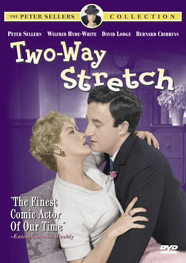
|
Two-Way Stretch
Anchor Bay
1960 / b&w / 1:78 anamorphic 16:9 / 78 min. / Street Date January 21, 2003 /
$89.98 (19.98 indiv.)
Starring Peter Sellers, David Lodge, Bernard Cribbins,
Wilfrid Hyde-White, Maurice Denham, Lionel Jeffries, Irene Handl, Liz Fraser, Beryl Reid,
George Woodbridge, Thorley Walters, Warren Mitchell
Cinematography Geoffrey Faithfull
Edited by Bert Rule
Original Music Ken E. Jones
Written by Len Heath and John Warren
Produced by E.M. Smedley-Aston
Directed by Robert Day
|
|
|
|
|
Synopsis:
Soon-to-be-released prisoners Dodger Lane (Peter Sellers), Jelly Knight (David Lodge)
and Lennie Price (Bernard Cribbins) are living a life of ease, thanks to regular deliveries through
their cell window, and a favorable relationship with the Chief Prison officer, Jenkins (George
Woodbridge). They even have the liberal Governor (Maurice Denham) snowed into thinking they're
reformed and rehabilitated, when in truth they're conspiring with notorious criminal Soapy Stevens
(Wilfrid Hyde-White) to commit a major heist using the alibi of incarceration. Soapy sneaks in posing
as a vicar, and all is set, until Jenkins is replaced by the hard-as-nails Chief P.O. Crout (Lionel
Jeffries). But the boys manage to take the wind out of Crout's sails and break prison for their
planned crime - taking a fortune in Arabian jewels out from under the noses of the Army!
Cute but nothing much to write home about, Two Way Stretch has a little fun with prison-movie
expectations, but mostly cruises on the considerable charm of its leading players. Sellers does a
good job
with his laid-back crime mastermind, but doesn't strain his acting muscles. Almost everyone
else goes for broke. Lionel Jeffries is line-perfect as the hard-nosed martinet, and it's nice to see
Maurice Denham getting a large part as a deluded warden. After Sellers, Wilfrid Hyde-White is probably
the most familiar name in the cast for us Yanks. He's delightful as a perpetually good-humored
conman. David Lodge and Bernard Cribbins are amusing as Sellers' corrupt cellmates. In smaller roles
are Thorley Walters, once again playing a military fool, and Liz Fraser and Irene Handl doing their
ditzy blonde and wacky matron act.
One pleasant surprise is Beryl Reid of
The Killing of Sister George, who has a
sizeable bit as a visiting charity worker. She trades risqué double-entendres with Denham
over an oversized cucumber-shaped vegetable he's growing in the prison garden.
Two Way Stretch is amusing, but never a belly-laugher, and tends to repeat tame prison comedy
situations rather than go anywhere new. The British Lion production is handsome, and Robert Day's
direction flexible and easy-going, but the script only has so much inspiration to offer.
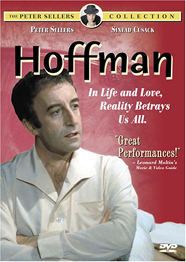
|
Hoffman
Anchor Bay
1970 / color / 1:78 anamorphic 16:9 /113 min. / D /Street Date January 21, 2003
/ $89.98 (19.98 indiv.)
Starring Peter Sellers, Sinéad Cusack, Ruth Dunning, Jeremy Bulloch
Cinematography Gerry Turpin
Art Director John Blezard
Edited by Barrie Vince
Original Music Ron Grainer
Written by Ernest Gebler from his novel.
Produced by Ben Arbeid
Directed by Alvin Rakoff
|
|
|
|
|
Synopsis:
Middle aged Benjamin Hoffman (Peter Sellers) blackmails young
Janet Smith (Sinéad Cusack) with her fiancee's crime, forcing her to
spend the week with him - intimately. At first smarmy and insinuatingly cruel,
the tone of his attentions changes, while she uses her initial reprieve from
rape, to find out why he should do such a dastardly thing.
Here's the odd man out in the collection, an almost forgotten color picture from later in Sellers' career. Hoffman is the perfect film product from the early 70s in England: a picture no sane producer
should ever think could find an audience. And it didn't. Reportedly disappearing soon after its release,
the film found few friends, and even Sellers asked that it be destroyed. The problem isn't him - it's
one of his more serious and difficult roles - but a concept that asks too much of us.
The story of a man who forces his attentions on a woman, who eventually falls in love with him, must be
irresistable, because it keeps getting repeated. Literature, I don't know about, but in film you have
Jack Garfein's Something Wild, and William Wyler's The Collector, just for starters. Think
about the subject, and things like The Graduate qualify as well. Pedro Almodóvar has
tackled the subject at least once, in
Átame!. Savant isn't adverse to
every non-PC idea that comes along - I just made several paragraphs of excuses for
Straw Dogs - but Hoffman can't help but
be an unpleasant business. Young Miss Smith's discomfort and misery is real throughout, the wealthy, older
Hoffman is domineering and entirely selfish, and the only mystery we find is why the movie should end the
way it does. (spoilers aplenty follow)
Miss Smith keeps demanding respect, but if she's so naive as to believe that a man who forces her to
sleep with him can be trusted in any other way, we lose respect for her. As it turns out, she's doing it
for love, and she later discovers that the beneficiary of her sacrifice is unworthy. Hoffman behaves
in a way completely opposed to any possibility of a trust building, but Miss Smith decides to take his
lonely pleas at face value, and, boing!, falls in love with him.
Now Pedro in Madrid manages to weave more than one idea in with his weird amorous kidnapper story, and his
way of telling a tale constantly reminds us that when it comes to Love, there are no rules - statuatory
rape for one person, might be a blessing for another. Hoffman is one of those odd
characters who is completely attractive, with no reason whatsover to be unable to find human companionship,
even if he first had to struggle through some partners attracted to his wealth. But of course, he has to
possess the woman he wants - the opposite sex can't be given the option of free choice.
Just as Hannibal Lecter teaches, Hoffman covets the girl he can see, at work. With her boyfriend proved
a louse, Miss Smith runs to Hoffman's arms. People may be so desperate that
they turn to whoever wants them, but I don't call that a positive thing.
The unpleasant thing about the end is that Miss Smith opts for such a selfish bargain of her own - no work,
piano lessons, freedom to help choose colors for her new kitchen. Hoffman offers domestic bondage, and
she's eager to sign up. It's surely preferable to her worthless, pimply boyfriend Tom, and his equally
selfish mother. When the object of Antonio Banderas' affections in Átame! surrenders to him,
you get the feeling that a reckless female desperately in need of a guiding mate, has been rescued. Here,
it just seems that an abusive middle aged man has picked off yet another young girl, before she's had
the chance to find herself.
That said, Hoffman is a far sight less annoying than Sellers' so-called comedy with Goldie Hawn,
There's a Girl in My Soup, from around the same time. It's odd how one kind of sexist claptrap is
commercial, and another is not.
One thing Hoffman is, is well produced. Alvin Rakoff's direction is assured, and both Ms. Cusack and
Sellers are able to build impressive character sketchs. The photography is attractive, and there's a touch
of class to the whole affair. Ron Grainer's music is particularly good - it hasn't dated, a claim not many
films English or American from 1970 can make. And that's even with a love ballad sung by Matt Munro - it's
quite good.
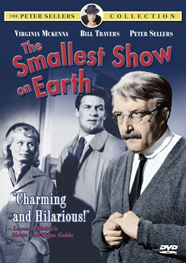
|
The Smallest Show on Earth
Anchor Bay
1957 / b&w / 1:78 anamorphic 16:9 / 80 min. / Big Time Operators /
Street Date January 21, 2003 / $89.98 (19.98 indiv.)
Starring Virginia McKenna, Bill Travers, Margaret Rutherford, Peter Sellers,
Bernard Miles, Francis De Wolff, Leslie Phillips, June Cunningham, Sid James
Cinematography Douglas Slocombe
Art direction Allan Harris
Edited by Oswald Hafenrichter
Original Music William Alwyn
Written by John Eldridge and William Rose
Produced by Sidney Gilliat, Frank Launder, Michael Relph
Directed by Basil Dearden
|
|
|
|
|
Synopsis:
Thinking they've inherited a fortune, Matt and Jean Spencer (Bill Travers and Virginia
McKenna) discover their legacy is a rundown theater called The Bijou, sandwiched between two noisy railways
and completely overwhelmed by the local picture palace, The Grand. The Grand's owner, Albert
Hardcastle (Francis De Wolff) might be persuaded to buy the Bijou, but Matt and Jean are forced to
make a show of trying to re-open it first, while dealing with the cantankerous old guard who run the place:
ticket seller Mrs. Fazakalee (Margaret Rutherford), Old Tom the doorman (Bernard Miles), and the
drunken projectionist, Percy Quill (Peter Sellers). With a playlist made exclusively of ancient
Westerns, the Spencers think they can squeeze by.
A quaint film with an affection for the old-time movie experience, The Smallest Show on Earth
is mostly a rather predictable sitcom involving the running of an old movie house. Once the
concept gets rolling (it takes a couple of reels), and the dusty ambience of the rundown Bijou
takes hold, an okay level of interest emerges. The familiar acting team of McKenna and
Travers is charming, and the three old-timers who work for them are well-played, if not much more
than what we expect. This is a key example of a little 'nice' film that people remember warmly,
even if its impact is not very strong.
Once again, Peter Sellers' role is actually secondary to the main story. His alcohol bender provides
the 3rd act crisis, but it's never resolved as any more than an incident in the Spencer's list of
problems, like the tart-ish candy girl (ungallantly given the name Hogg) whose pregnancy is tossed off for a
quick joke.
Most of the little adventures in the theater are ordinary hijinks, like Travers having to run the
projectors himself and making a mess of things. But two scenes stick out as special. The re-opened
Bijou's first customer is a tough little boy who can't resist the gunfire and whooping Indians
coming from the soundtrack, and he enters the 'fleapit' auditorium as I used to at his age - like it
was a church where miracles happened. The second scene is a nostalgic throwaway. Jean and Matt
return late to find their employees reverently projecting a silent film while Margaret Rutherford
plays the piano. It's very touching.
The idea that a run-down house might show Westerns may not be unusual - film critics writing about
the Western genre in the early 70s mentioned little U.K. theaters that showed oaters exclusively - and
had hobby horses up front for little kids to ride on while watching. Sounds like fun, coming in
out of the cold and gloom to see the big open skies and wide landscapes.
Of the players, Bernard Miles is almost unrecognizable under his 'Old Tom' makeup - just a couple of
years before he was the main villain in Alfred Hitchcock's
The Man Who Knew Too Much. I thought I saw
Liz Fraser doing an unbilled bit as a necking teenager in the back row. Familiar funnyman Sid James
has only the briefest of scenes, railing about his daughter's pregnancy. Strangely, the way the
subject is presented, there's a brief implication that our hero, married man Matt, may
be responsible for Miss Hogg's delicate condition.
The ending is very low-key, especially because we're primed for The Bijou to once again become a picture
palace, restored to its former glory. Evidently British Lion didn't believe the public would go for
miracles like that. Instead we end on another strange note, with our heroes now inadvertent accessories to
a major crime, and getting away with it!
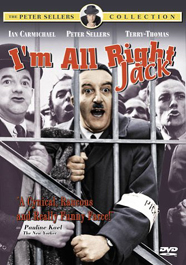
|
I'm All Right, Jack
Anchor Bay
1959 / b&w / 1:78 anamorphic 16:9 / 105min. /
Street Date January 21, 2003 / $89.98 (19.98 indiv.)
Starring Ian Carmichael, Terry-Thomas, Peter Sellers, Richard Attenborough, Dennis Price, Margaret Rutherford, Irene Handl,
Liz Fraser, Miles Malleson, Marne Maitland
Cinematography Max Greene
Art director Bill Andrews
Edited by Anthony Harvey
Original Music Ken Hare
Written by John Boulting, Frank Harvey and Alan Hackney
Produced by Roy Boulting
Directed by John Boulting
|
|
|
|
|
Synopsis:
Upperclass twit Stanley Windrush (Ian Carmichael) goes looking for a real job, and
after several fiascoes, is shoehorned into the ranks at Missiles Limited, an arms manufacturer
with a severe labor problem. The shop steward, Fred Kite (Peter Sellers) is an ignorant petty tyrant
and professional gadfly, forever tormenting management over trivial matters, and encouraging strikes
on any pretext available. Staffing manager Major Hitchcock (Terry-Thomas) is trying to sneak in
a spy (John Le Mesurier) to prove that the incredibly slack employees can indeed go faster, and
Stanley inadvertently precipitates a massive strike, that balloons to cripple the nation. When
Kite finds out Windrush has 'collaborated' with management, he's livid, and Kite's daugher Cynthia
(Liz Fraser)
is unhappy too - as she and Stanley were getting on well in the necking department. Stanley's
Aunt Dolly (Margaret Rutherford) inspires Stanley to become a scab and go back to work, alone, but
neither of them realize that factory owners Bertram Tracepurcel (Denis Price) and Sidney de Vere Cox
(Richard Attenborough) have arranged the whole debacle to make it possible for them to pull off an
international arms swindle with a crooked Egyptian, Mr. Muhammed (Marne Maitland).
Sellers has a plum part in this justly famous farce, that plays like a Mad Magazine layout
and pulls
off some edgy comedy material that's still fairly surprising. Idiot Carmichael visits a chocolate
factory and throws up in the mixing machine, in the picture's most gut-wrenching laugh. Also very
Mad -like is the throwaway gag of a worker sneezing onto a tray full of fresh product.
I'm All Right Jack is actually a sequel to a service comedy called Privates' Progress,
with several key characters returning.
But even more surprising are the randy sexual jokes, both visual and verbal. The picture is bookended
with nudist camp scenes that are pretty explicit, topped by a flurry of running female rumps that
remind of the illumination art on the old Mad title page. This unexpected wildness is matched
by a continuous run of double-entendres that are so droll, one starts looking for dirty meanings in
almost everything that's said. "Meet my daughter Cynthia. She's a spindle-polisher."
The insane setup is just credible enough to be offensive to all, as the script gleefully
paints almost all Englishmen as silly fools corrupt beyond redemption. It stays safely neutral
by lampooning businessmen as cads and charlatans, and the workingmen as lazy Communist sympathizers
looking for unearned rewards, while opposing anything constructive. It even leaves the situation
totally unresolved, with a last-minute crusade by Stanley proving ineffectual against the rotters
in both camps.
Framing its tale as a mock-serious critique of post-war societal changes, I'm All Right Jack's
ample nerve isn't at the service of any kind of underlying philosophy. The workers are incensed at
the idea of working with blacks or Arabs or Indians, all of
whom are collectively and repeatedly called 'darkies'. A gaudy, jangly rock'n roll vocal goes
behind the cartoon opening titles, that are reminiscent of James Thurber. The general attitude is
best summed up by a stuttering worker who blurts out Porky Pig-isms like, "Oh, why don't you
f-f-f-f, forget it!" The title is part of an obscene remark, that's actually sung in the
title song. I may be wrong, but the lyric seems to be, "Blow yourself Jack, I'm All Right" (!!)
Ian Carmichael is funny as the main idiot on display, but there isn't a real central character,
just a passel of fools and victims. Sellers' pinko shop steward is the most interesting,
with his constant blather
about better working conditions in Russia, and other things he knows absolutely nothing about. His
speech is a fractured mess of mispronounced words and other giveaways that he's an unschooled lout
desperate for authority and power. With his little moustache, he looks like Hitler. The strangest
thing is that his character isn't really played for laughs.
Likewise Terry-Thomas is almost subdued, and Richard Attenborough effective in a smaller part. Liz Fraser
juts out her chest constantly in a Diana Dors imitation (with a joke that makes the reference explicit),
and has some priceless reactions to the suggestive dialogue. Miles Malleson plays his entire part
nude, with a basket of peas on his lap. The smile on his face as a dozen plump nymphs gallop past leads
me to believe that he died happy. Rapt face-spotters will catch genre regulars Kenneth Griffith
(Circus of Horrors), Donal Donnelly
(The Knack, Michael Bates (A Clockwork
Orange), and John Van Eyssen
(Horror of Dracula.)
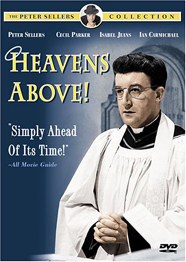
|
Heavens Above!
Anchor Bay
1963 / b&w / 1:78 anamorphic 16:9 / 118 105 min. /
Street Date January 21, 2003 / $89.98 (19.98 indiv.)
Starring Peter Sellers, Cecil Parker, Isabel Jeans, Ian Carmichael,
Bernard Miles, Brock Peters, Eric Sykes, Irene Handl, Miriam Karlin, Miles Malleson,
Roy Kinnear, Kenneth Griffith
Cinematography Mutz Greenbaum
Art Direction Albert Witherick
Edited by Teddy Darvas
Original Music Richard Rodney Bennett
Written by Frank Harvey and John Boulting
Produced and Directed by John and Roy Boulting
|
|
|
|
|
Synopsis:
Due to a clerical error, progressive vicar Rev. John Smallwood (Peter Sellers)
is put in charge of the Church of
England in Obiston Parva, a small town with a big pharmaceutical plant that
dominates the local economy and culture. He offends the guardians of the status quo by letting
the freeloading and untrustworthy Smith Family move into the vicarage, but efforts to dislodge him
by the authorities are stymied by the surprise patronage of Lady Despard (Isabel Jeans), who
pulls her family's interest in the factory to fund Smallwood's radical charities.
Soon
the local economy is hit badly when Parva and Smallwood give away food to the ungrateful public;
when he becomes a national celebrity, his harsh words for the plant's major product (a stimulant,
depressive and laxative in one) causes the business to fail, wiping out the livelihood of most of
the area. Smallwood's charmed beginning goes sour, with the whole town turning against him.
Heavens Above! is the most interesting film in this collection, mainly because it tackles
its satirical subject with ambition and wit, doing quite a number on the 'good Samaritan' genre of
Church-ified movies. For a bit of perspective, let's just say that Savant normally keeps a respectful
distance away from things like The Bell's of St. Mary's.
The inspirationally - motivated film genre actually meets a rare touch of reality here. Instead of
a teflon saint, Sellers' idealistic Rev. Smallwood is easily duped. He inspires
people with his good works, but also attracts plenty who would take advantage of him.
Buñuel made the difference between the church's mission and the realities of life a major theme
in his wickedly forthright Nazarin and Viridiana; The Boulting brothers outdo themselves
here by going partway down the same road. Smallwood is no Bing Crosby, crooning his way into harmony
while putting a new roof on the church. Without getting nasty about it, Heavens Above! shows the
open-hearted Smallwood becoming the sucker and patsy for many of those he helps. The destitute
family to whom he gives shelter, rips him off shamelessly, and his Mr. Deeds -like lesson in
generosity is abused by a citizens that take all they can get and then fight over it.
Heavens Above! is full of symbolic talk and clever jokes, but unlike some of the shows in this
collection, they consistently add up to a coherent point. For instance, when a train compartment of
churchmen are told not to miss the Last Supper being served,
the joke doesn't come off as cheap. The story also has pace - the screenplay deftly uses Fritz Lang
associative cuts to leapfrog its story forward. Scene changes are often prompted by the mention of
some object, which across the cut to the new scene, reveals some visual or verbal irony. There's also
a nice sense of symmetry to the jokes. When Smallwood stumbles into a freshly-dug grave at the
beginning of the picture, we have no idea how meaningful the gag will become.
Sellers is fine, in what is really a dramatic role - and finally a central role. Instead of
a skit-like impersonation, Sellers inhabits the do-gooder Smallwood so capably, one
would think that he was wasting his time in comedies. Heavens
Above! would seem to have happened between his two Kubrick hits, perhaps completing his British Lion
contract. Amusingly, in one scene a kid reads Lolita in the back of the church.
The script has two immense surprises, which I'll try to discuss without creating too big of a spoiler.
First, the Capra-esque expectations associated with the genre are thwarted when Smallwood is abandoned
by the friends and helpers who have gathered around him like disciples. Nobody denies him three times,
exactly,
but when the town turns into a vindictive mob, even Jamaican immigrant Brock Peters, a Poitier-like
faithful friend, splits and doesn't come back. The regal Lady Despard quite sincerely found
the meaning of charity, but turns her back on him as well. And the Smith Family, in which there were plenty of
seeds of meaningful contact, disappear in the night like gypsies, taking the church's gold
they go. None of these characters returns to atone, or receives any judgment from the script. Contradicting
what would happen in a Capra film,
there's no upswell of civic or spiritual rebirth. Nobody passes the hat to prove that Smallwood
has friends. When people act badly, the film is frank - arguing factions in Obiston Parva are
quick to slander Jews and victimize blacks. And they're not presented as cartoons - a
further contrast with the other satires in the collection.
The second surprise, is that Heavens Above! doesn't sell us a bill of goods that what
Smallwood was doing was necessarily a good idea - there's no kneejerk endorsement of an automatic
rightness to his efforts. By giving away goods, he cripples the economy, and by inadvertently making
himself a celebrity, his words wipe out the source of everyone's paycheck, even if it is a pill
nobody needs. By showing us that an honest & sincere idealist can indeed cause havoc, Heavens Above!
takes a fair stance, encouraging us to look for whatever else it might have to say. It's the most
intelligent film here, much moreso than the funny I'm All Right Jack.
The film is really over when Smallwood's tenure comes to it's sorry end. But Heavens Above! keeps
going,
finding a satisfactory ending only by suddenly starting up a new movie. The story has truly painted itself
into a corner, so it can be forgiven for taking drastic measures. But the last reel does seem tacked-on;
it drags in a Quatermass-like rocket project, and contrives to have Smallwood do what James Bond did in
You Only Live Twice! Interesting then, that
this ending doesn't ruin the picture - it has a bit of the effect of the end of the rapturous
Miracle in Milan. In that bizarre fantasy, the poor are abandoned by society, and literally take to
the sky on brooms, seeking in Heaven the reward denied them on Earth.
A big surprise, Heavens Above! is one of the last titles Savant reached for,
and it turned out to be the most
rewarding. The cast is again made up of many British Lion regulars. Ian Carmichael is a
duped parson who is made to look the nitwit only by circumstance; Cecil Parker is excellent as a
church official trying to walk a tightrope of propriety. Bernard Miles is back as another aged
butler (and not a benign one). Eric Sykes is the crafty squatter Smith, and Roy Kinnear
makes a good impression as the out-and-out crook of the story. Irene Handl and Kenneth Griffith offer
interesting contributions as well. Brock Peters is an American success story from
Heavens Above! - it's an interesting role for him on his way to stardom.
The transfers of these films are nigh flawless, with 5 solid b&w transfers and one very good color one. The
extras are on the thin side, with a nice bio on Sellers repeated on each disc, and a few trailers when
available. Again, the only possible nag for Anchor Bay is the lack of English subs, although there are
Closed Captions.
Peter Sellers Collection Boxed Set
Packaging: 6 keep cases in a card box
Reviewed: March 11, 2003
DVD Savant Text © Copyright 2007 Glenn Erickson
|
|
|